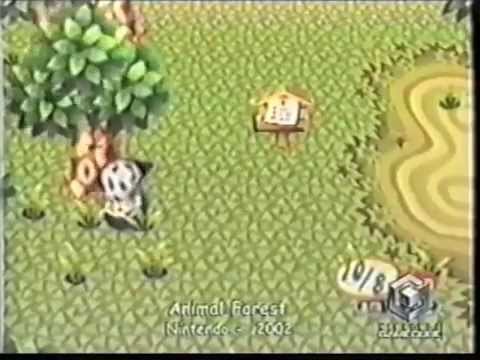At multiple points in her summary of the history of Animal Crossing, Kelsey Lewin discusses the seeming impossibility of marketing a game like this. She documents the first, almost entirely forgotten clip discussing the game at E3 2001, sandwiched between high profile titles like Super Smash Bros. Melee and Metroid Prime. See the clip for yourself here. As Lewin notes, the clip is just digging holes and chopping down trees mostly. This certainly doesn’t seem like the precursor to one of Nintendo’s biggest franchises but, well, here we are. Why is Animal Crossing so popular anyway, seems to be the initial question of Kelsey Lewin’s Boss Fight book.
The first important caveat to that statement is that Lewin is mainly discussing the first Animal Crossing game, for which there are five distinct versions. Animal Forest is for the Nintendo 64, Animal Forest+ is for the Gamecube, Animal Crossing, the Western localized version of Animal Forest+ is for the Gamecube, Animal Forest e+, which added the Western localized content and more to the Gamecube for a Japanese audience, and finally, Animal Forest for the iQue Player, a very late port of the original game for the Chinese market. What makes these games significant, in Lewin’s view, is their embrace of the communication game model.
What exactly does that mean? Well, nobody really knows. But Lewin has a lot of neat hypotheses, backed up by extensive research into Animal Crossing’s development process. To put it simply, Animal Crossing is not a game about trying to achieve any specific goal. It is a game about trying to live the life you want to live in a community with no reward greater than the satisfaction you feel about having had a chance to change it for the better.
As might be expected from a game that first came out in 2001 for hardware that is, by modern standards, quite crude, Animal Crossing doesn’t have especially sophisticated artificial intelligence. There are exactly six personality types of the many, many NPC villagers in the game. But it’s easy to feel like there’s more depth than is really there. Part of this is due to the sheer quantity of text making it so that it’ll take you some quite some time to see one villager repeat another villager’s words. There’s also the fact that they all have different faces and are represented by different animals, that makes it very easy for any player to make personalized assumptions about them.
Then there’s the randomized nature of the town itself- no two towns are exactly the same, although they’re all generated according to a specific topograhical template. Lewin argues that, despite the customizability of the game, the having a room of one’s own, as it were, much of the appeal of Animal Crossing is the idea of escaping into a mundane, carefree world where you don’t really have to do hardly anything. Yet you still want to explore, and you still want to make friends with the villagers, because the world is a magical place even if we can only control little bits of it.
Lewin fully acknowledges that her opinion is a minority opinion. Subsequent Animal Crossing games give the player increasingly more control over the town. In New Leaf for the 3DS, the player becomes the mayor, with disproportionate influence. In New Horizons, the most recent Switch installment, the player builds their town from the island up with crafting mechanics. Strictly speaking, while newer Animal Crossing games allow multiple human players in the same town, the structure no longer encourages this kind of alternating play the same way the first titles did. If Animal Crossing was about role-playing as a doll in the dollhouse, the newer games are more about being the child who can make whatever dollhouse she likes.
There’s nothing wrong with this alternate wish fulfillment. It’s just substantially different in a way that’s a little sad. This is the difference between a communication game and a game that’s just about showing off. I love my old Animal Crossing town for the silliest reason. By dumb luck, the villagers Wolfgang and Puck live in the same acre. When I scroll over D-1, I see Wolfgang Puck. This absurd digital coincidence makes me loathe to ever visit another town ever again, lest either of them decide to leave.
I don’t expect anyone to be impressed by this. That’s kind of the whole point. It’s just something that’s funny to me, a sort of metaphor about the whims of life, and how so much of the wonder of it can be attributed to things we can’t control, even if for the most part, we can still control a lot of it. The perspective’s a philosophical one borne out less by the original design team’s vision so much as their limitations. Even as early as Animal Forest e+, options start popping up to be a bit more of a nuisance to the villagers by dictating their lives, or at least their real estate. The original Animal Forest had no museum or tailor mostly because those ideas weren’t quite ready yet by the time the game needed to ship.
It did have NES games, though. That was always my main goal was trying to get them and turn Animal Crossing into a fairly elaborate and interactive NES emulator. This wasn’t a right or wrong way to play the game. Indeed, so much of the appeal of Animal Crossing is that there isn’t a right or a wrong way to play it, you can just wander around communicating however you like. I’m communicating my silly old stories right now, not in Animal Crossing, but because of Animal Crossing. To me, the game was useful mainly to the extent it allowed me to be self-reflective.
I should visit that town again sometime. Hapland? My sister called it that. Not really sure why. I guess because she wanted it to be happy. And she was also really competitive with it despite my lack of interest in competing, or even there really being a way to compete. All in all, it was pretty fun. Anyway, about Kelsey Lewin’s book. I suspect you’ll get more out of it if you have stories like mine you’d like to tell to no one in particular. It’s not that Lewin is bad at communicating or anything like that, far from it, the core concept is just strange enough that you really had to be there.

The post A review of Animal Crossing from Boss Fight Books appeared first on Old School Gamer Magazine.







